This is a recipe for Hard Boiled Eggs, a staple for a lot of people who are on several types of diets. We will show you how to make perfect hard boiled eggs every time. We will show you the tips and tricks of how to cook them, and how to peel them. It’s easy to do and once you get the hang of it you can do it over and over and over again.
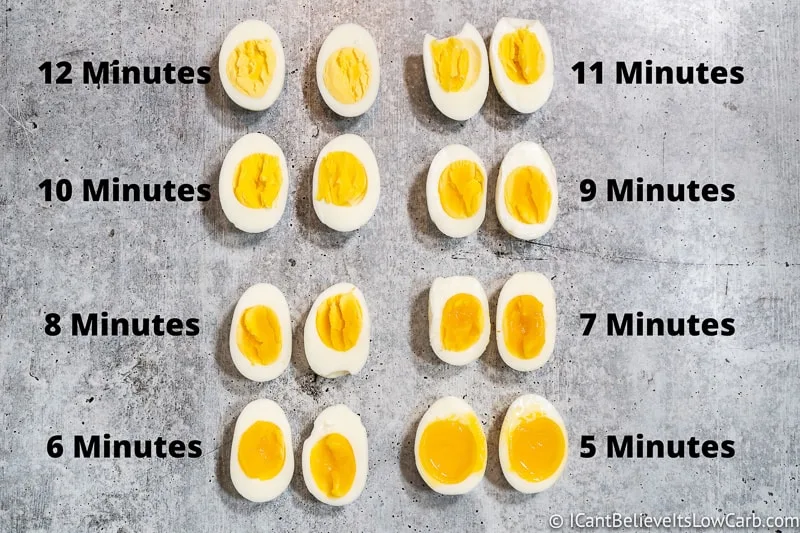
Hard boiled eggs are one of the most perfect and complete foods you can eat. They are a good source of protein and healthy fats and are easy to make. They make a good breakfast, a good snack at any time of the day, and can be packed up easily and taken with you anywhere you go.
One reason some people hold off making hard boiled eggs is that they don’t know how to hard boil eggs and worse yet…they don’t know how to get the shells off. So we will share with you how easy it is to cook perfect boiled eggs and how easy to peel hard boiled eggs without the usual frustration.
What are Hard Boiled Eggs?
Hard boiled eggs are that perfect, oval-shaped snack that many people love because they are not only good tasting but also so versatile.
The outer part of boiled eggs is firm and white, but the inside can be soft or hard and anything in between, depending on your preference or on how you will be eating them.
Just like if you are making fried eggs on the stove, some people like them hard, medium, or soft boiled.
Perfect hard-boiled eggs can be made one at a time or in a bunch, that way you can keep them in the refrigerator for about 5 days, to have for a quick breakfast or a snack, or to eat on a salad.
This saves time and ensures that you will have a quick snack to help keep you on your diet. If the boiled eggs are prepared ahead of time you will reach for them when you’re hungry or in a hurry instead of junk food or something else you shouldn’t eat.
Are Hard Boiled Eggs Healthy?
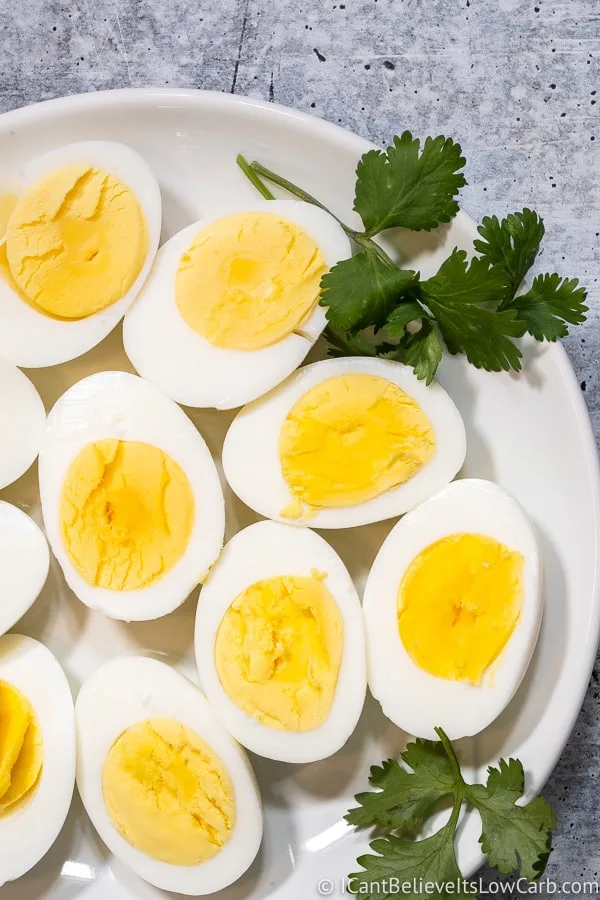
Hard boiled eggs are a good food to eat because they are a good source of protein without the added fat. The calories are low and the carbs are almost nonexistent, with only 1 carb in each. They are among the most nutritious foods on the planet.
One large boiled eggs contain:
- Vitamin A, B, D, E, K
- Folate
- Phosphorus
- Selenium
- Calcium
- Zinc
If you buy the eggs that are Omega-3 enriched or pastured then they are even healthier.
To sum it up eggs contain a little bit of almost every nutrient that you need.
How Many Calories in Hard Boiled Eggs?
Hard boiled eggs are relatively low in calories. Each large hard boiled egg has:
- 77 Calories
- 5 grams of fat
- 6 grams of protein
Is it OK to Eat Hard-Boiled Eggs Every Day?
If you like hard boiled eggs then it is perfectly ok to eat them every day. In fact, it is one of the most nutritious foods on the planet. Although eggs can raise bad cholesterol in some people, studies have shown that eating up to 3 eggs per day is perfectly safe for healthy people.
Every Way to Boil Eggs
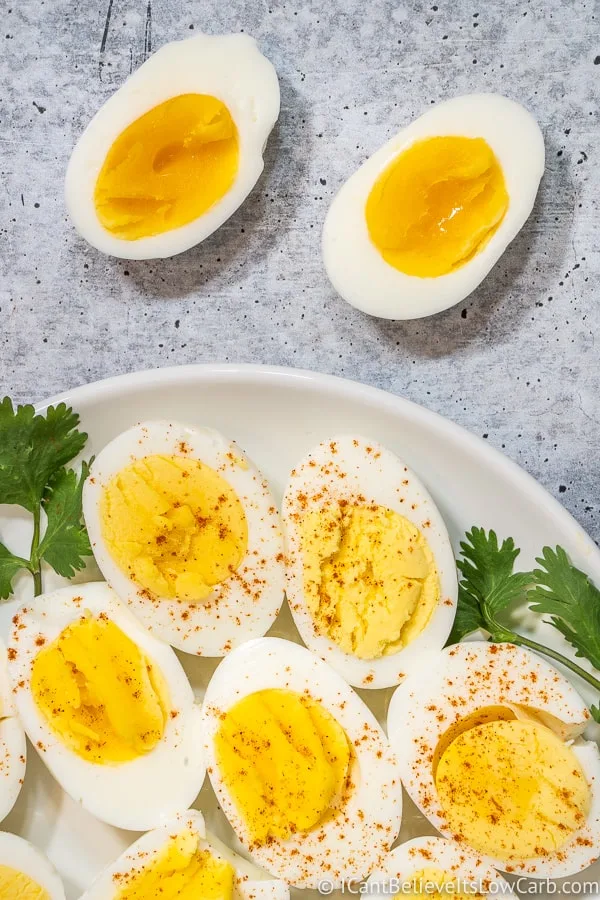
There are several methods for making boiled eggs, the pressure cooker, the microwave, and the oven, but the stove seems to be the way that most people are familiar with.
The best way to hard boil eggs seems to be a matter of opinion because if you ask people that you know how “they” make hard-boiled eggs, you will get so many different answers.
I have tried so many different ways over the years and I will admit that, in my opinion, some of them work and some of them don’t. So I will share with you the techniques that I feel work the best to make perfect boiled eggs.
- Option 1: You can start off with cold water and the eggs in the water and then start the boiling process.
- Option 2: You can boil the water first and then add the eggs and continue to boil.
- Option 3: You can bring the water to a boil and then turn off the heat, put a lid on it, and let the steam continue to cook the eggs.
What is the Easiest Way to Hard Boil Eggs?
After trying so many different ways, the easiest way to make the best hard boiled eggs is to start off with boiling the water first, then add the eggs to the pan, boil them for 10 minutes and rinse with cold water. Then crack the shell all over and begin to peel.
I find this to work good every time and I don’t have to worry about adding salt or vinegar or use any other tricks to get the shells off.
Soft Boiled vs Hard Boiled Eggs
Whether you want to have soft boiled or hard boiled eggs or anything in between, it’s up to you. You can use the same steps here to make either soft or hard boiled eggs. All you have to do is adjust the length of time that you cook them for.
In order to show you how to boil eggs, we have created a chart of eggs ranging from soft boiled at 5 minutes all the way up to 12 minutes which are hard-boiled and everything in between.
We discovered that the white part of the eggs, even though they were cooked at several intervals, was cooked the same no matter the time. The consistency of the yolk is the only thing that changes, depending on the length of minutes.
Ingredients for Boiled Eggs
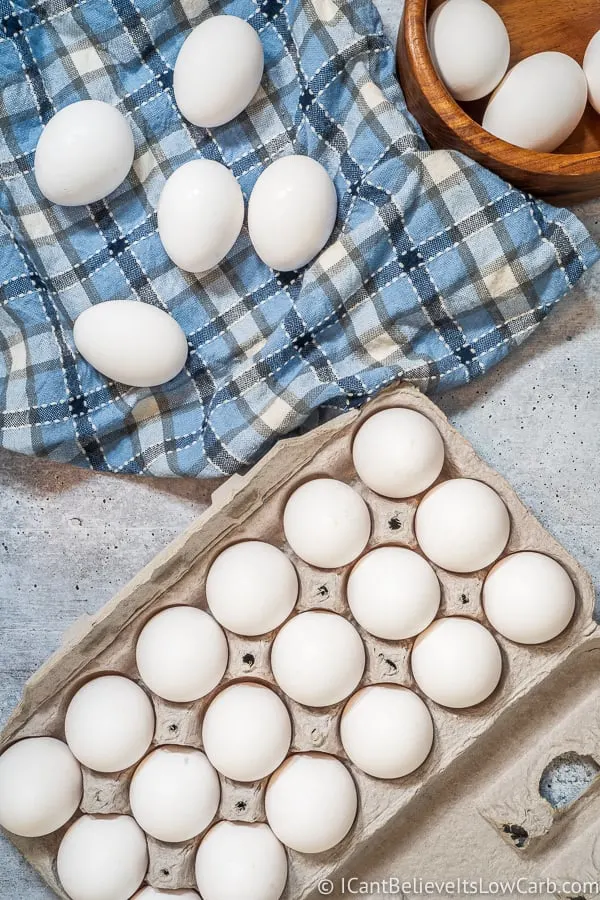
- Eggs – Large eggs are the most common size with the most availability in the stores.
- Salt (Optional) – This is used in the water to soften the shells to make it easier to peel.
- Vinegar (Optional) – This is used in the water to soften the shells to make it easier to peel.
What Size Eggs are Best to Boil?
It really doesn’t make a difference what size eggs you use to make hard boiled eggs, just use your favorite size if you have one. Medium, Large, Extra-Large and Jumbo all work.
Large eggs are the most common size that is available in the stores, and that’s what we used for this recipe. Keep in mind, If you use a different size egg then you will have to adjust the cooking time.
Should I Use Fresh Eggs?
If you have ever had fresh eggs from a farm they are so different from store-bought eggs. They are very tasty and are good to use if you are going to cook them when making scrambled or over-easy eggs.
But in this case, they are not good to use for perfect boiled eggs…the shells will not come off very easily or not at all.
If you decide to use fresh eggs then it is best to let them age at least 10 days before boiling them. If you really want to make them easy to peel, then I would wait 2-3 weeks. For that reason, we usually just use them for scrambled eggs instead!!
Tools to Use
The beauty of this hard-boiled egg recipe is that they are easy to make and you don’t need to use too many things from your kitchen to make them. In this recipe it’s more about how to make hard boiled eggs, instead of worrying what things to use that you may not have in your kitchen…..
You just need:
- Medium Saucepan
- Timer
- Slotted Spoon
How to Perfectly Hard Boil Eggs
We are going to walk you through the step by step process of how to make hard boiled eggs.
This is my preferred method for making the best hard boiled eggs, and it’s the easiest because you don’t need to add anything to the water to help make it easier to get the shells off, and it works all the time.
STEP 1: The first step to making hard boiled eggs is to take the eggs out of the refrigerator about 10-15 minutes before you are ready to cook them.
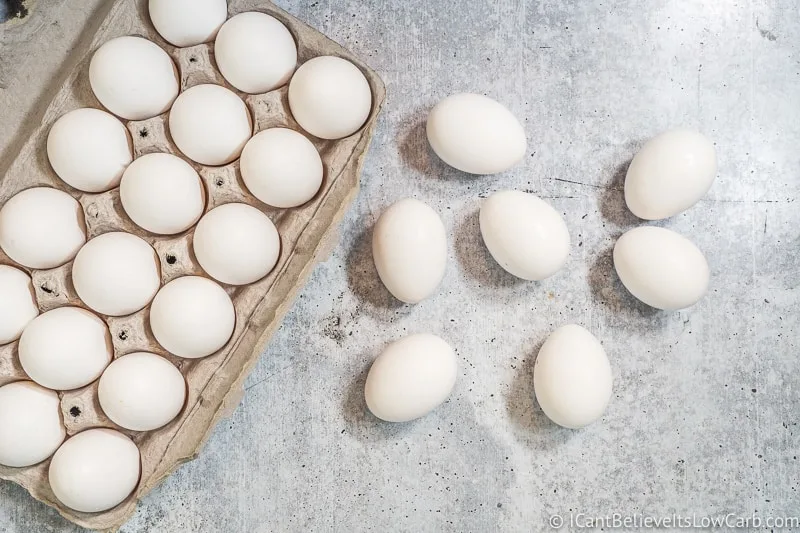
STEP 2: Get a saucepan and fill it halfway with water. Put the pan on the stove and turn on the burner on high.
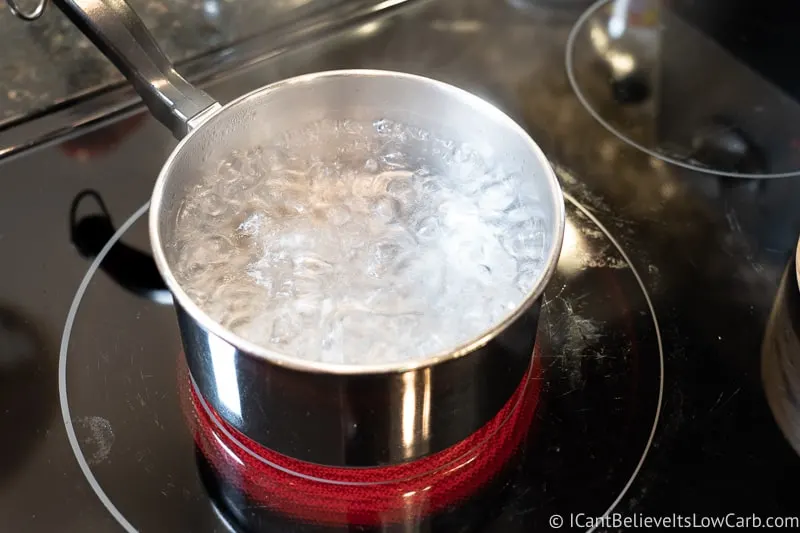
STEP 3: When the water is boiling, gently lower the eggs into the water with a slotted spoon.
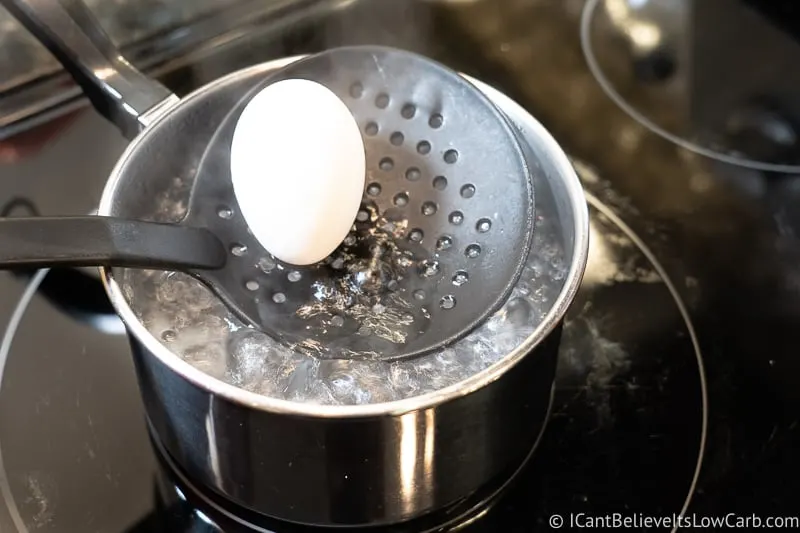
STEP 4: Now set the timer for 10 minutes (for large eggs), and let the eggs continue to boil.
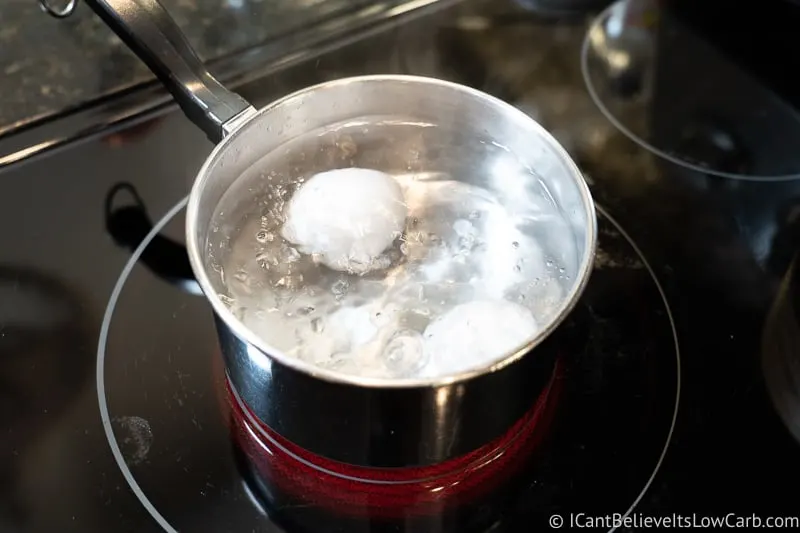
STEP 5: When the timer goes off, drain the water and fill the pot with cold water.
STEP 6: Next, crack the eggs in the pan and then roll them on the counter until the entire egg is cracked all over.
STEP 7: Immediately peel off the shells.
How do You Hard Boil Eggs so that they Peel Easily?
Peeling the shells off the eggs has been the lifelong dilemma attached to making hard boiled eggs. After all, if you can’t get the shells off easily or not at all then you get frustrated and maybe will never try to do it again.
The best way to boil eggs is to boil the water ahead of time and then slowly and gently add the eggs to the pan.
The other trick that works for me in removing the shells is to right away after they are done cooking, put them into cold water, and start at once to crack the entire shell which makes the membrane break and in turn makes the egg peel easily.
Do You Boil the Water First for Hard Boiled Eggs?
When you are learning how to cook hard boiled eggs, you may wonder whether to start the eggs off in cold water or hot water? The jury is split over the correct answer.
I have tried it both ways with pretty equal results. Years ago I researched a lot of ways to make the best hard boiled eggs in order to find the best way to get the shells off, and I prefer to start with the water boiling first. My husband on the other hand, does it starting with cold water and both of our eggs come out great.
Covering the Pan
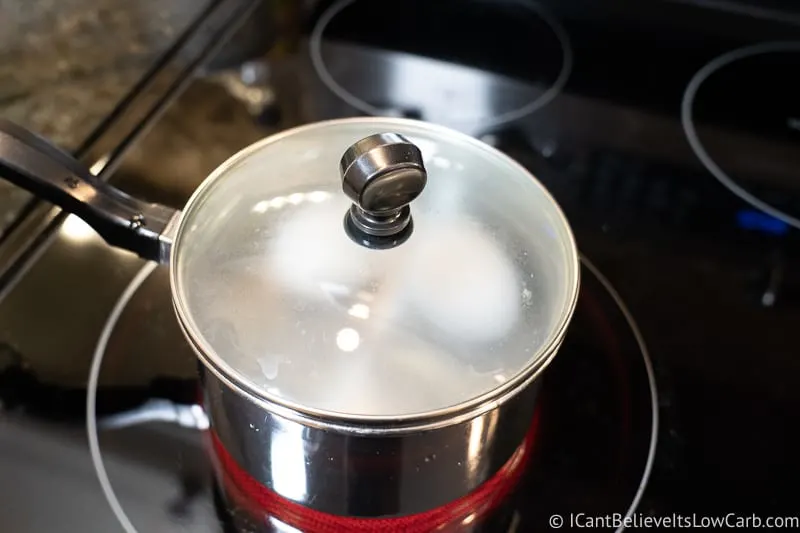
Another question that may come up when learning how to cook hard boiled eggs is whether you should use a lid to cover the pan or not.
The reason some people use a lid to cover the pan is once they turn the burner off, they cover the pan to trap the heat in to complete the cooking process of the eggs.
I have tried making hard boiled eggs that way and it does work, but it’s not necessary.
How Long to Boil Eggs
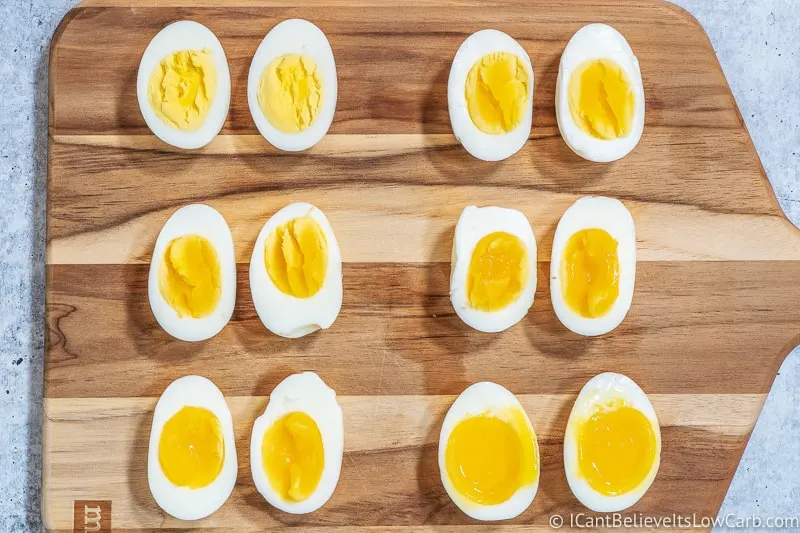
The cooking time to make perfect hard boiled eggs will vary depending on how large the eggs are and how you want the yolk to come out, soft, medium, and hard.
We will show you by means of a chart on the different variables and then you can make an educated decision, how to boil eggs, depending on your likes and dislikes.
Hard Boiled Eggs Time Chart
Here is our How Long to Hard Boil Eggs Time Chart:
We boiled eggs at different 1-minute intervals to try to show you how long to boil them according to how you like your eggs. We used large eggs because it’s the most common size in the stores and probably in your home too.
- 5 Minutes – The white is medium boiled and the yolk is gooey
- 6 Minutes – Medium/hard-boiled
- 7 Minutes – Hard-boiled with a very creamy yolk
- 8 Minutes – Hard-boiled with a creamy yolk
- 9 Minutes – Hard-boiled
- 10 Minutes – Semi-firm yolk/Hard-boiled
- 11 Minutes – Firm yolk, Hard-boiled
- 12 Minutes – Dry yolk, Hard-boiled
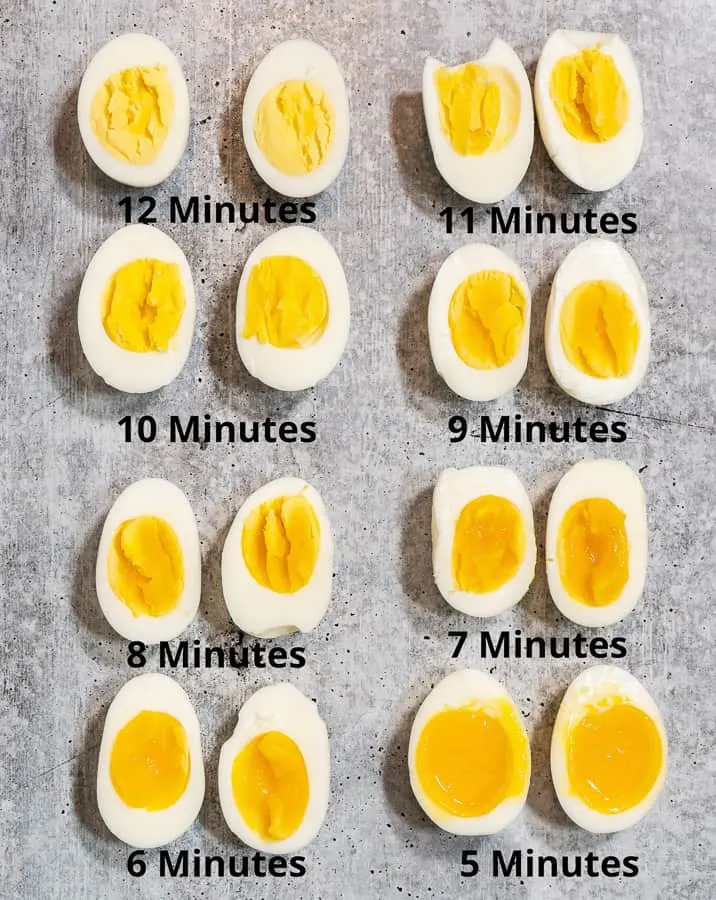
Is 10 Minutes Long Enough to Boil an Egg?
10 minutes is the perfect time to boil an egg.
Some people think they have to cook their boiled eggs a lot longer than 10 minutes, for fear that they will go to peel them and they won’t be cooked. In our recipe, we cook our large eggs for 10 minutes to get them hard-boiled.
Egg Size Differences and Cook Time
Large eggs are the most common size and that’s what we have used throughout this recipe for the best hard-boiled eggs.
If you decide to alter the size of the egg to medium or to extra large then lower or raise your cooking time by a minute or two.
How do You Know When Eggs are Done Boiling?
It’s really simple to know when the eggs are done cooking. Just set your timer and follow the chart above and you will make perfect boiled eggs every time.
You do not have to cut them open in order to make sure that they are cooked all the way through.
If you are concerned that you didn’t start the timer at the perfect moment, then cook the eggs an extra minute just to be sure.
Is 20 Minutes Too Long to Boil Eggs?
If you have never made hard boiled eggs before, you may be nervous or even afraid of not knowing how long to cook them. What makes it hard is that you can’t see through the shell, so you may figure a few extra minutes won’t matter. But it will matter.
20 minutes is way too long to boil an egg. Your eggs will be extremely overcooked, so we don’t recommend it.
Do Hard Boiled Eggs Float When They Are Done?
I guess we are going back to school for this one because this sounds like a science experiment that we used to do. The eggs can float for various reasons, but it doesn’t mean that they are done cooking.
There are a few reasons why eggs can float:
- If the water is fresh, it is less dense than saltwater, so the eggs sink.
- If the water is salty, it is denser, so the egg floats.
- When the air cell is sufficiently large enough to keep the egg buoyant.
- When the egg ages, it is less dense and more likely to float. But be careful that the eggs are not rotten.
- When the egg is cracked, then the egg white will leak out into the water which will reduce the mass of the egg, in turn, making it easier to float.
Does it Matter How Many Eggs You Boil at One Time?
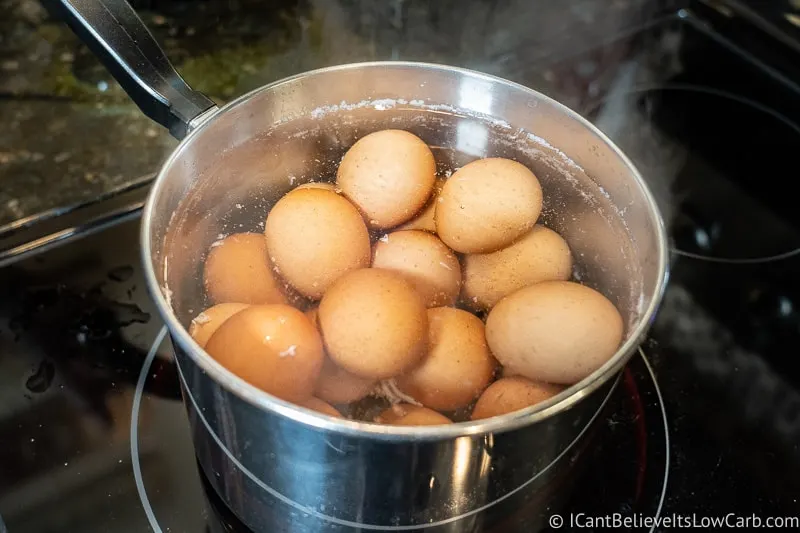
You can certainly boil more than one egg at a time but you don’t want to overcrowd your saucepan. Eggs need to have about half an inch of extra water covering over them to make sure that they cook evenly.
Also, the cooking time can vary if there are too many eggs in the pan at once because they are not getting an even flow of water around them.
The best thing to remember is: don’t boil more eggs at a time than can lay flat on the bottom of your pan. If only 4 eggs can lay flat at the bottom of the pan, don’t put more than 4. If it’s 6, then that’s the maximum you can put.
Should You Put Boiled Eggs in Cold Water/Ice Bath?
Some people think that when the eggs are done cooking you should drain the hot water out of the pan and fill with cold water and ice cubes, making an ice bath. The purpose of the ice bath is to stop the eggs from cooking any further. Then you peel the eggs in the bowl of ice water.
This is one of those areas that some people do and some people don’t do. I have tried this step before but it’s kind of tricky. When the eggs are too cold, it’s harder to get the shells off. So if you do use an ice bath, make sure to peel the shells immediately, or they will be hard to get off.
How to Do It
If you do want to use an ice bath, here is the best way:
- Get a bowl and fill it half way with cold water and ice cubes to bring up the water level until the water and ice fills the bowl about ¾ full.
- Take the eggs out of the pan and with a large spoon transfer them into the ice bath.
- Immediately begin to crack your eggs all over and peel off the shells.
Using Salt and Vinegar to Boil Eggs
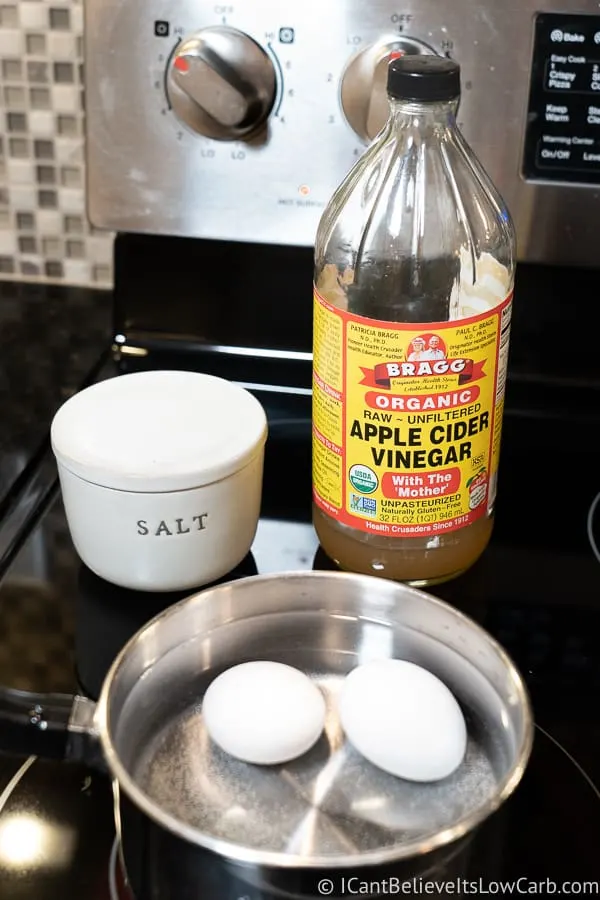
There are 2 everyday common ingredients that many people use because they think it will ensure that you get perfect hard-boiled eggs. They are:
- Salt
- Vinegar
From our experience, these are not essential for making hard boiled eggs but they are an option that can help.
Here’s what happens…
Salt –
Adding the salt to the water increases the temperature of the water and will raise the boiling point slightly. It will not shorten the length of time it takes but it will boil at a higher temperature. The white of the egg will cook faster because of the salt which will prevent the yolk from overcooking.
If you can, sea salt is the best to use for cooking and eating your boiled eggs. It’s full of minerals and requires just a pinch in the water.
- It also seals the leaks and cracks. If you place the egg in the pan and it develops a crack the salt will help the crack to seal faster.
- A small amount of salt permeates the eggshell so it will aid in peeling off the shell. And don’t worry, it won’t make your egg taste salty.
Vinegar –
Vinegar can be added to the water at the same time you add the eggs. It’s the acidity from the vinegar that makes it easier to peel.
You can use both white vinegar or apple cider vinegar, whichever you have in your cabinet, or whichever you like the best. If you use apple cider vinegar, I would recommend Braggs brand.
Peeling Hard Boiled Eggs
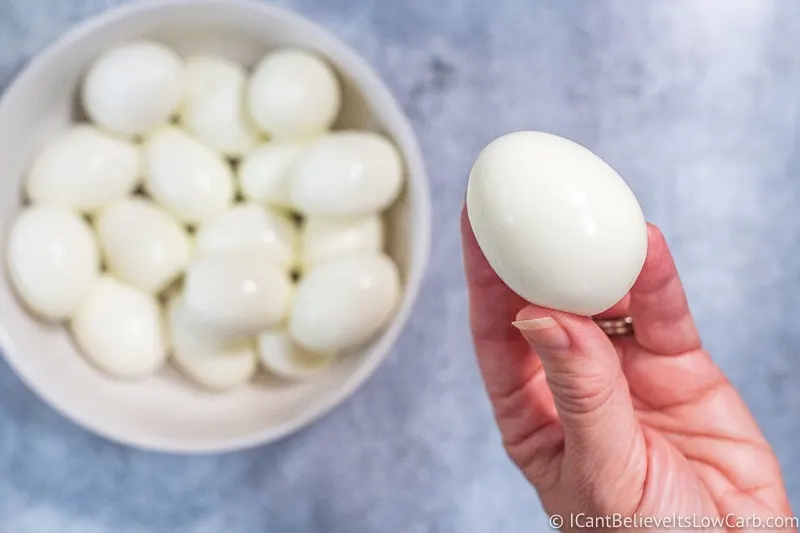
Peeling hard boiled eggs might be the hardest thing that keeps many people from making them. It can be very discouraging if you make the eggs and then can’t get the shells off at all. Or you get part of the shells off but at the same time you pull off chunks of the white part and you end up throwing them away.
No worries anymore because we can help you make easy-peel hard boiled eggs successfully. Here are the steps to follow:
- When the eggs are done cooking, drain off the hot water and fill the pan with cold water.
- The main goal for perfect boiled eggs is to break the membrane while the eggs are still hot/warm, so start to crack the shell all over the entire surface in the pot of water. You can also take it out of the water and roll it around the counter until the whole eggshell is cracked.
- While the egg is still warm, peel off the shells. If they are a little stubborn coming off in a section then dunk it in the pot of water again or under running water from the faucet. The egg being wet will help the shell to come off. The shells will come off in big sections once you get it started.
When Should You Peel Hard Boiled Eggs?
In my opinion, you should peel the shells off as soon as possible because as the eggs get too cold it becomes harder to peel them off. DON’T store them without peeling them first.
If you only peel off the shells of the eggs that you are going to eat right away and then put the rest of the eggs in the refrigerator before peeling off the shells, you will never get them off the next day or any other day after that.
So do yourself a favor and peel all of your eggs and store them in the refrigerator peeled.
Best Tips
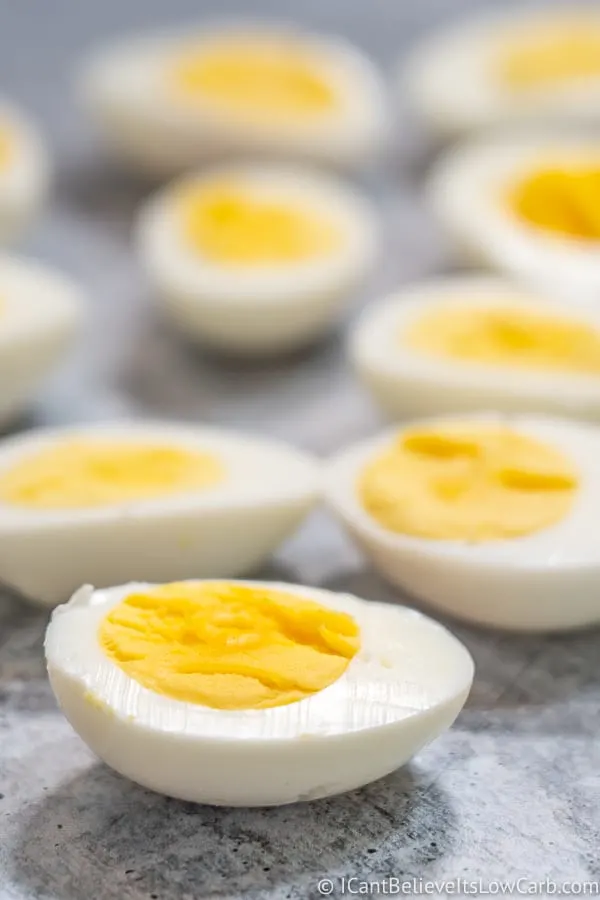
When you don’t know how to make a recipe, then it’s a good thing when someone who has made it before can give you some help by sharing some important tips on how to boil eggs so you can have success!
- I think the most important thing to remember when making perfect hard boiled eggs is to start off with the right kind of eggs. Use eggs that are at least 10 days old because if the eggs are farm fresh, new eggs you will never get the shells off.
- You can use any size eggs that you want to but large eggs are the most common size in the stores and in most people’s refrigerators.
- When you add the eggs to the pan into the water, it’s good to gently lower them into the pan with a slotted spoon to help the eggs from cracking.
- When you are ready to lower the eggs into boiling water, don’t use cold eggs right out of the refrigerator, instead let the cold eggs warm up a few minutes to keep them from cracking.
- If the egg cracks, you can add a little bit of vinegar to the water because it will help congeal the egg white if it starts to leak out of the shell.
- Boil the eggs over medium-high heat. If it’s too high the water will boil out. If it’s too low it won’t really boil properly which will alter the cooking time.
- Set a timer so that you don’t overcook the boiled eggs or undercook the eggs.
- Adding salt to the water can make it easier to peel the shells off the eggs.
- Also, vinegar or baking soda can be used in the water to help make it easier to peel the shells off.
Why Won’t My Eggs Peel Easily?
The eggs may not peel off easily because the egg may have gotten too cold. The water in your house may also have a bearing on the peeling process.
Here are some tricks that you can try to help condition the egg so that the shells will come off easier:
- Add ½ tsp of salt to the water. Any kind of salt will work.
- Add a splash of vinegar to the water. Either white or Apple cider.
- Add ½ tsp of baking soda to the water. This can increase the alkalinity of the water.
- If you have an egg that is giving you trouble even if you have already cracked the entire egg, then peel it under running water or let it sit in a bowl of water for a few minutes. The water will penetrate under the shell which will make it easier for the shell to peel off.
Why Are My Boiled Eggs Dry?
If you overcook your eggs, then it only makes sense that they will get dry in the process. Once it gets dry there is no turning back.
Why Is There a Green Ring in my Hard Boiled Eggs?
Did you ever go to a breakfast buffet and are looking forward to eating one of the hard boiled eggs? This is especially exciting if you like boiled eggs and don’t make them at home because you never learned how.
You get back to your table and you cut open the egg to find that it has a green ring around it! it’s not very appetizing, so you push it aside and get something else to eat. So much for hard boiled eggs!
The reason for the green ring around it is not because the egg is bad, but instead, it’s because they were boiled way too long.
This happens when you are too busy and forget about them on the stove or if you worry about making sure every spec of the egg is cooked thoroughly.
The green ring is formed as the egg gets overheated, which causes hydrogen and sulfur in the egg white to react and form hydrogen sulfide gas, which reacts with the iron in the egg yolk to form a greenish ring between the white and the yolk.
Another trip back to school for another science experiment!
How to Prevent Eggs from Cracking
It can be annoying for some of your eggs to crack and in turn, leak out in the pan. It kinda makes a mess in the pan around the good eggs.
One reason why eggs crack in the pan is that the water may be boiling too rapidly and the eggs that just got added to the pan have not had enough time to start cooking before the boiling water starts knocking the eggs around the pan.
To help prevent the eggs from cracking, add them carefully into the boiling water with a slotted spoon.
By taking them out of the refrigerator 15 minutes in advance it allows them to warm up a little, and thus prevents cracking.
One of My Eggs Cracked While Boiling, Can I Eat It?
You may have noticed that sometimes when you boil eggs, one of them cracks either when you are lowering it into the pan or it cracks during the cooking process. Don’t worry.
You may think about throwing it out because of the crack, but it’s perfectly ok to eat it.
Making Hard Boiled Eggs in a Pressure Cooker/Instant Pot
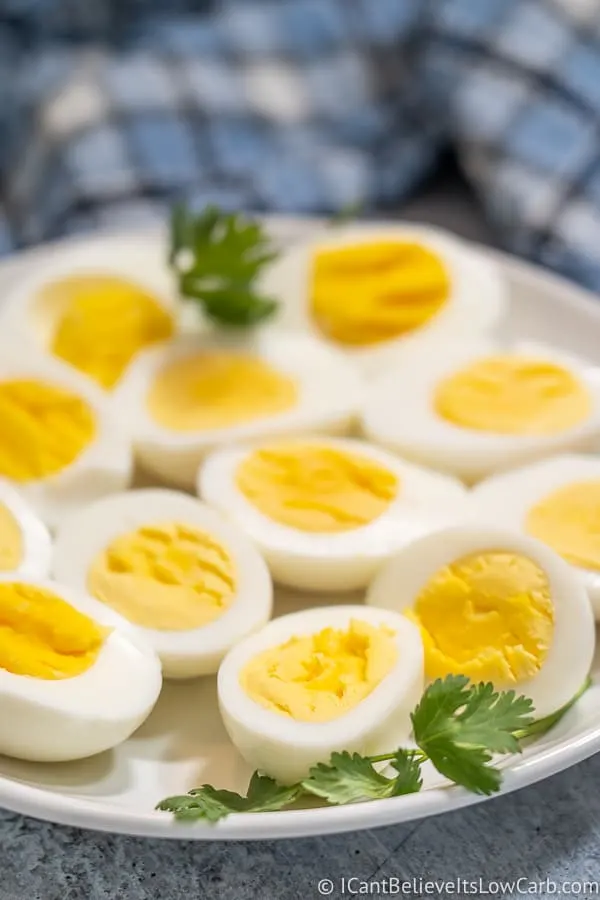
Why – Using the pressure cooker makes it easier to peel the eggs after they are done cooking, they just slip right off. You can use white eggs or brown eggs, and you can even use fresh eggs with this method.
You are also not limited to cooking just a few eggs at one time, you can cook a dozen or whatever fits inside your instant pot/pressure cooker.
How to Do It:
- Place the eggs in the steamer basket along with 1 cup of water and seal them inside.
- It takes about 5 minutes for the instant pot to come up to high pressure.
- It will take another 4- 5 minutes for the eggs to cook, depending on how you want your egg yolk cooked.
- And lastly another 5 minutes for the pressure to release.
- Peel them easily by rolling the egg around on the counter breaking the entire shell, peel should come off easily.
TIP – Most people today use the instant pot instead of a pressure cooker but if you have a pressure cooker, just cook your egg for 3 minutes.
Click here to read our full recipe for Instant Pot Hard Boiled Eggs.
Making Hard Boiled Eggs – Steamed
Why – Steaming helps to make easy-peel hard boiled eggs because the steam permeates under the shell, softening up the membrane.
How to Do It:
- Get a saucepan and put a steamer basket inside.
- Fill it with water about an inch over the bottom of the basket.
- Boil the water until you see steam.
- Turn off the heat and gently place the eggs into the basket with a slotted spoon, single layer.
- Now turn on the heat to medium-high and cover the pot.
- Soft boiled – 6 minutes
- Hard-boiled with a soft center – 10 minutes
- Hard-boiled thoroughly – 12 minutes
TIP – If you want to put a double layer of eggs in the basket then add a couple of minutes to the chart.
Making Hard Boiled Eggs – Microwave
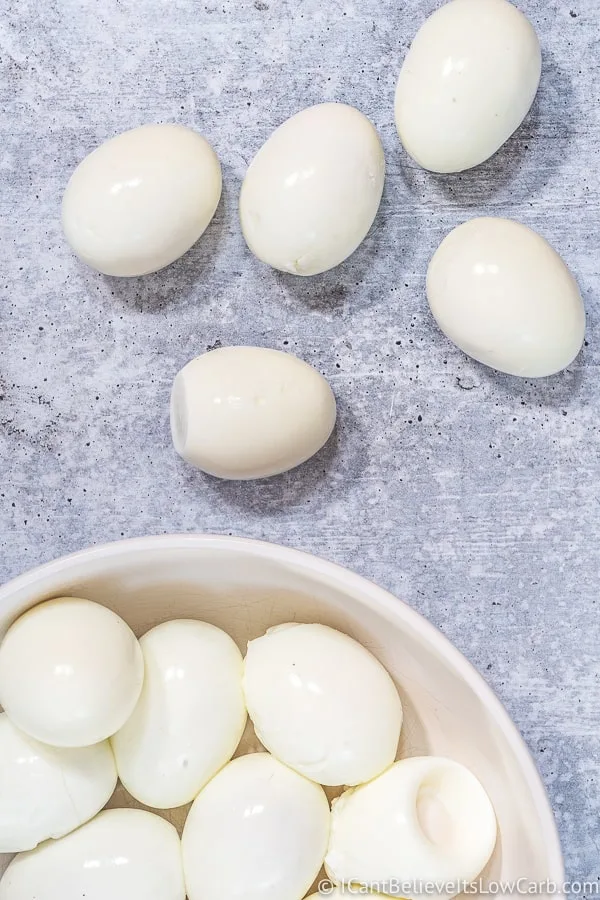
Why – You may not have a stove or you may want the eggs to cook faster than other methods.
How to Do It:
- Get a bowl that you can use in the microwave. Place the eggs in the bowl.
- Fill it with hot water to about ½ inch over the top of the eggs.
- Add ½ tsp of salt per egg, so that your egg will not explode in the microwave.
- For 2 eggs/4 minutes
- For 4 eggs/5 minutes
- For 6 eggs/6 minutes
- and so forth…..
For soft boiled eggs, take them out of the water immediately and place in an ice bath.
For hard-boiled, let them stay in the hot water for 2-3 minutes longer, on the counter, and then place them in the ice bath.
To peel them, follow the same peeling process by rolling the eggs on the counter to crack the shells.
TIP – If you don’t want to use salt then you will have to poke a tiny hole in the egg with a pin to release the pressure so that it doesn’t explode in your microwave.
Making Hard Boiled Eggs in the Oven/Baked
Why – The positive thing about cooking your eggs in the oven is that when the stovetop is full of other things cooking you can use the oven for the eggs. Also if you need to do a whole bunch of them at one time you could fit more of them in a large baking pan in the oven rather than on the stove.
How to do it:
- Place the eggs in a muffins pan.
- Preheat the oven to 350 degrees, 325 if your oven runs hot.
- Bake for 30 minutes.
- Once they are done cooking, make a bowl with ice cubes and water and submerge the eggs for 10 minutes.
- Then take them out of the bowl and roll them on the counter, breaking the shell around the entire egg, and peel.
TIP – Some tiny brown spots may appear on the egg but it’s just from the oven and they are ok to eat.
Diets This Recipe is Good For
Once you learn how to boil eggs, it can be a great food for almost any diet you are doing.
- Paleo – Eggs are one of the foods that can be eaten on this diet program.
- Gluten-free – Another great snack or meal option for someone who can’t have gluten.
- Dairy-free – No dairy in eggs.
- Nut-free – No nuts in eggs.
- Keto/low carb – One of the most perfect foods for meals and snacks.
- Vegetarian – Not all vegetarians eat eggs but some do.
How to Use Hard-Boiled Eggs
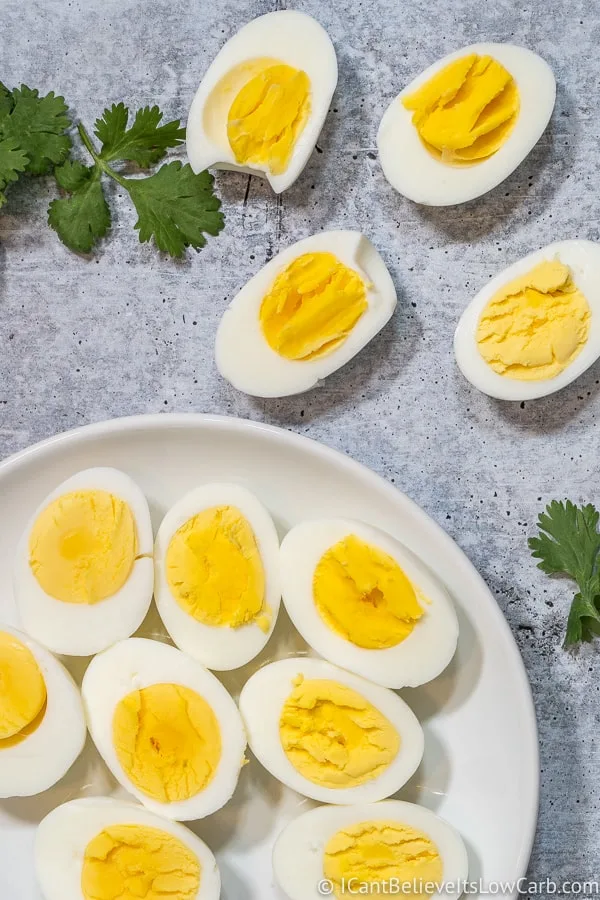
Now we get to the fun part of the recipe, because once we have boiled eggs and taken off the shells, we get to reap the joys of our hard labor.
Besides eating the hard-boiled eggs for breakfast or as a snack every day you can use them in many other recipes such as:
- Egg Salad
- Potato Salad
- Low Carb Potato Salad (Cauliflower)
- Tossed Green Spinach Salad with sliced eggs on top
- Deviled Eggs
- Tuna Salad with hard-boiled eggs on top or mixed in.
And the list goes on…
How to Store Hard Boiled Eggs
The best way to store hard-boiled eggs if you have some extra ones is in an airtight plastic container in the refrigerator. I usually put a paper towel on the bottom of the container to absorb any moisture that may come off the eggs.
They will come in handy for a quick breakfast or a quick snack.
How Long Do Hard Boiled Eggs Last?
If you properly store your hard boiled eggs, they will last in the refrigerator for up to a week.
How Long do Hard Boiled Eggs Last Unrefrigerated?
Sometimes you want to have your hard boiled eggs at room temperature instead of cold. In that case, after you make your hard-boiled eggs you can leave them out on the counter for a couple of hours, but that would be the limit.
You cannot store them unrefrigerated, and after a couple of hours, you need to put them in the refrigerator.
What Happens if You Eat Old Hard-Boiled Eggs?
If you eat eggs that are hard-boiled but that are old, you can get sick. The main risk of eating them for some people is salmonella infection, which can cause diarrhea, vomiting, and a fever and last 1-2 days. So do yourself a favor and skip the old eggs.
Can You Freeze Hard Boiled Eggs?
There are a lot of foods that can be frozen after making them to be able to enjoy at another time, but hard-boiled eggs are not one of them. The texture of them when thawing out is terrible, so I would not recommend it.
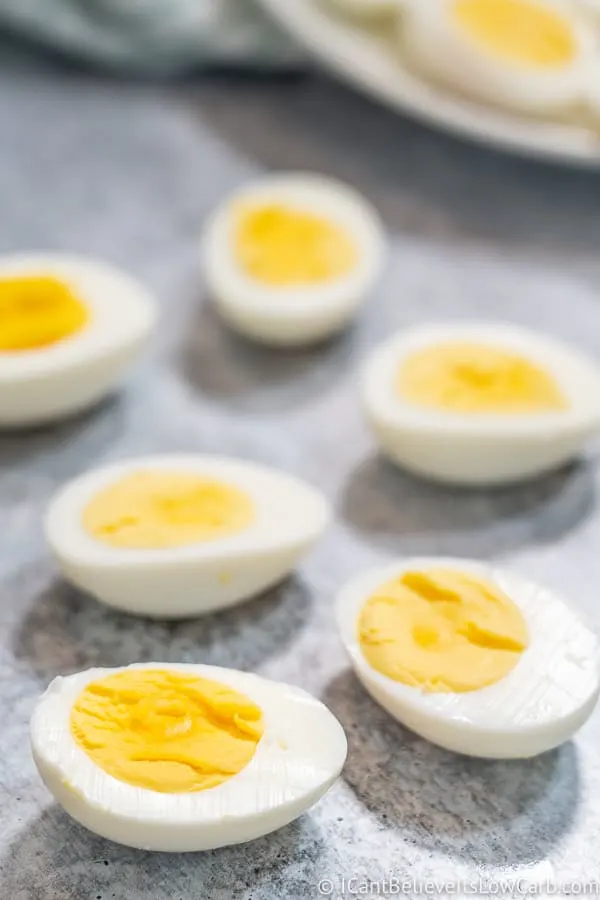
More Egg Recipes
If you’re in the mood for some other Egg Recipes then try our:
- Deviled Eggs with Bacon
- Soft Boiled Eggs
- Low Carb Egg Salad
- Best Spinach Salad with Eggs and Bacon
- Breakfast Egg White Cups
They all are Keto-friendly and low carb, and will be a hit at your next meal!
Print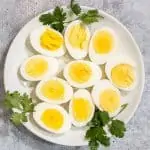
How to Make Perfect Hard Boiled Eggs
- Total Time: 25 minutes
- Yield: 4 Eggs (1 Egg Per Serving)
Description
This is a recipe for hard boiled eggs, the perfect, nutritious snack for a variety of diets. Step by step instructions along with helpful hints to help you be successful in making perfect hard-boiled eggs.
We will show you how to cook them and how to peel them. It’s easy to do once you get the hang of it and you can do it over and over again.
Ingredients
- Large Eggs
- Salt (optional)
- Vinegar (optional)
Instructions
- Take the eggs out of the refrigerator about 10-15 minutes before you are ready to cook them.
- Get a saucepan and fill it halfway with water. Put the pan on the stove on high heat.
- When the water is boiling, gently lower the eggs into the water with a slotted spoon.
- Now set the timer for 10 minutes, and boil.
- When the timer goes off, drain the water and fill the pot with cold water.
- Next crack the eggs in the pan and roll them on the counter to make sure that the entire egg is cracked all over.
- Immediately peel off the shells.
Notes
Large eggs are the most common size used but you can use other sizes if you prefer.
Use eggs that are at least 10 days old because if the eggs are farm fresh you will never get the shells off.
Use a slotted spoon and lower the eggs into the boiling water slowly and carefully.
Don’t use cold eggs right out of the refrigerator because they can crack easily. So instead take them out of the refrigerator to warm up for about 10-15 minutes.
If the egg cracks, you can add a little vinegar to the water because it will help to congeal the egg white if it starts to leak out of the shell.
Boil the eggs over medium-high heat, not high heat because it causes cracking if the water is boiling so much that it splashes right out of the pan.
Be sure to use a timer so you don’t overcook them.
If you think you may have trouble peeling off the shells you can add either salt, vinegar, or baking soda to the water. They get under the shells and loosen them up.
0 NET Carbs per Egg
- Prep Time: 15 minutes
- Cook Time: 10 minutes
- Category: Breakfast
- Method: Boiling
- Cuisine: American
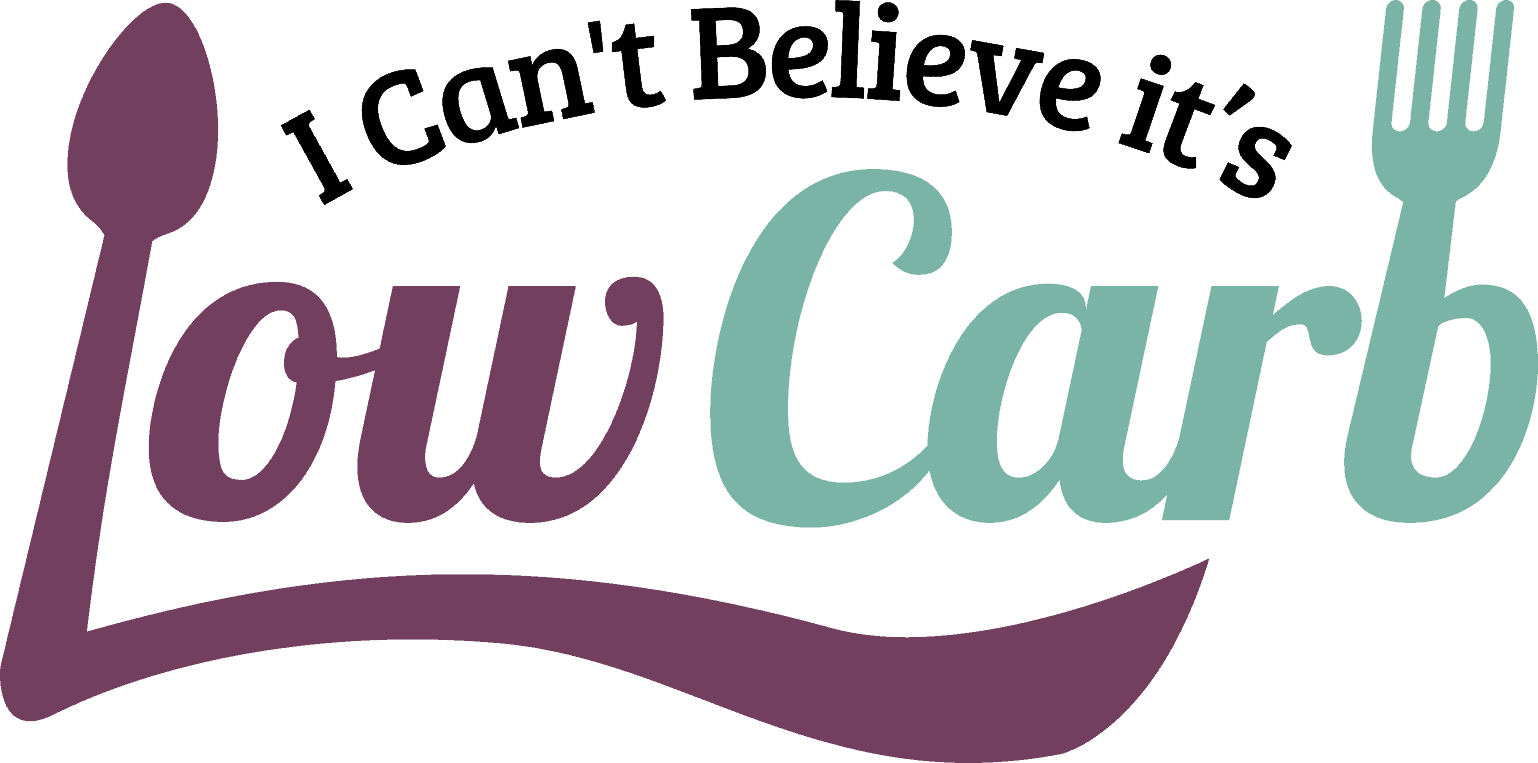
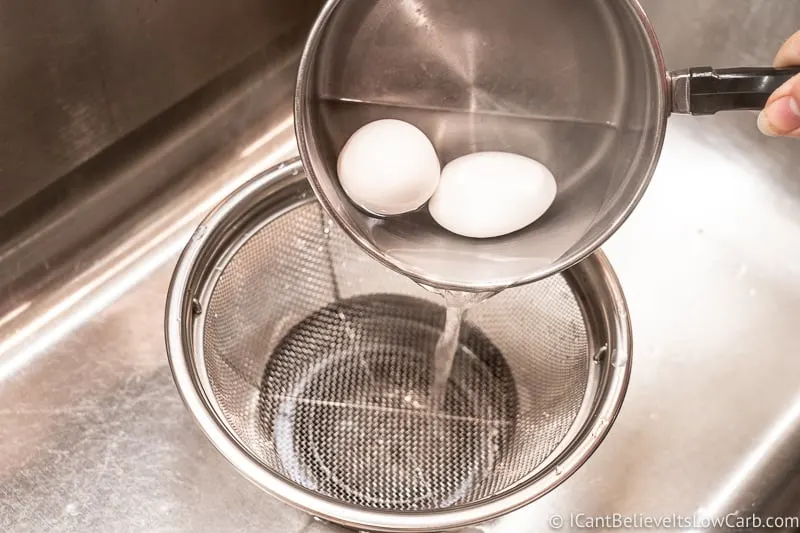
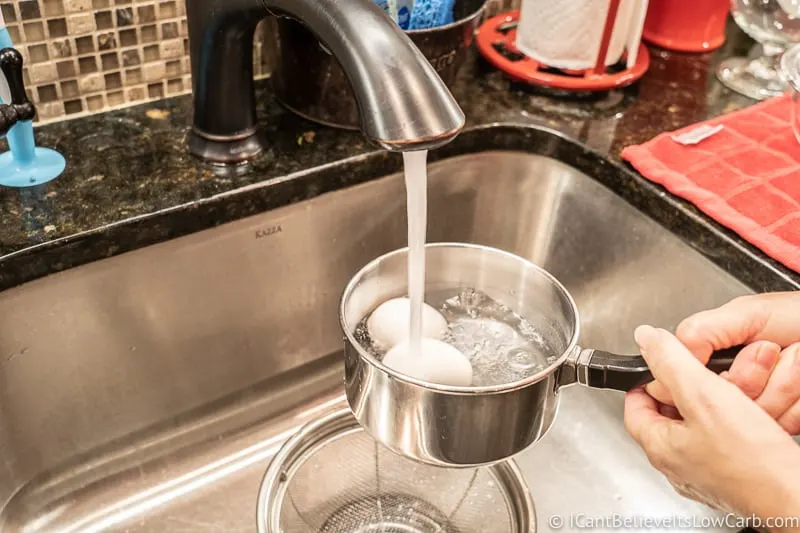
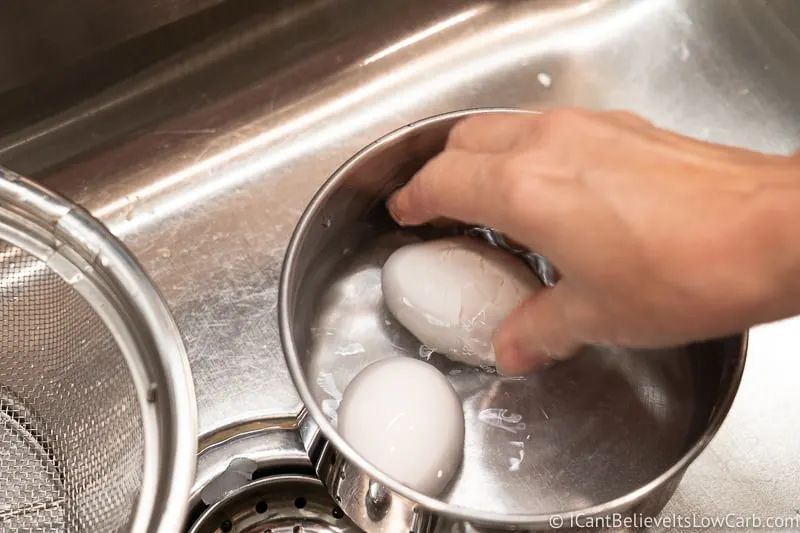
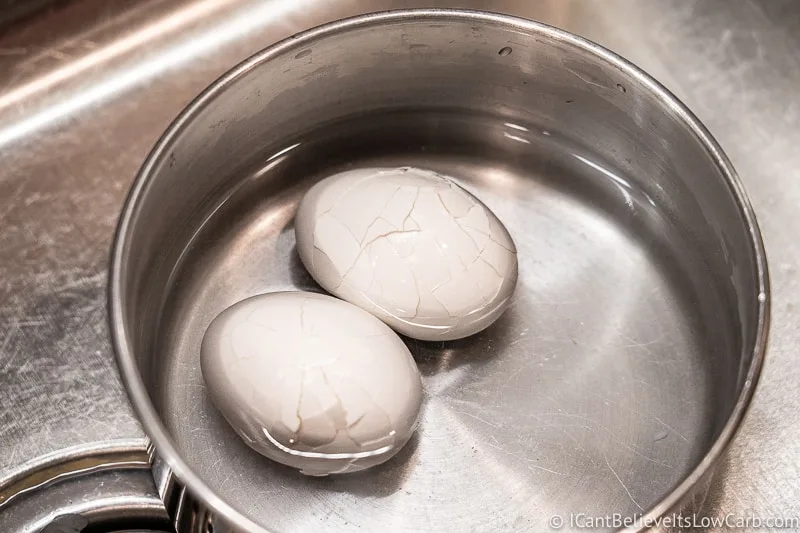
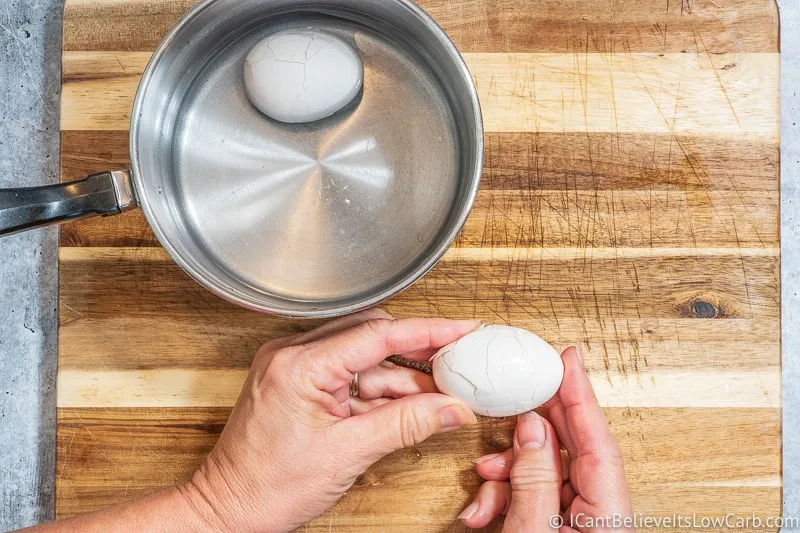
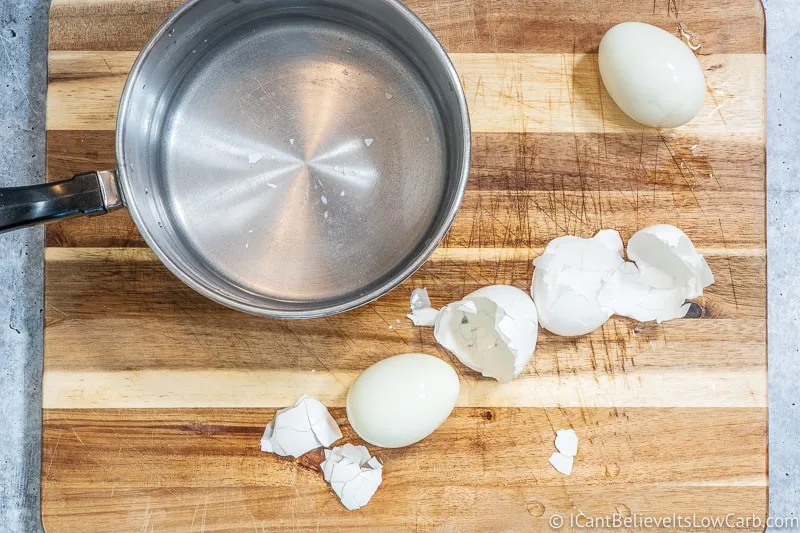
Phyllis
Saturday 29th of January 2022
I love deviled eggs
Leigh Oskwarek
Saturday 29th of January 2022
Thank you for looking at our hard-boiled eggs recipe.